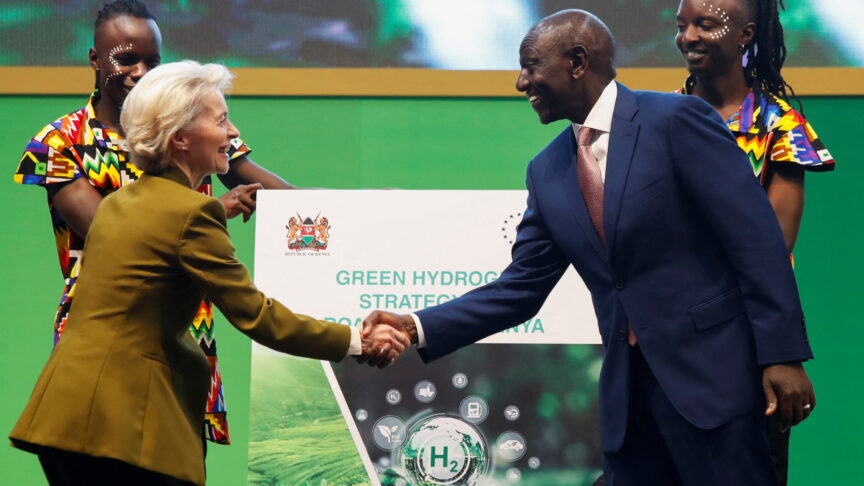China and the US: mirror image challenges
The leadership election in the US and the selection in China are mirror images of each other. So are the challenges that each will face, with implications not just for the US and China, but for the rest of the world.
The leadership election in the US and the selection in China are mirror images of each other. So are the challenges that each will face, with implications not just for the US and China, but for the rest of the world.
—
By a twist of fate, the world’s two most powerful countries have been selecting their new leaders in the same week. On the surface, they are almost perfect mirrors of each other.
While the US election had a nail-biting finish, the results were fairly predictable. In contrast, in Beijing, the next leader – Xi Jinping – was ordained several years ago to be appointed General Secretary of the Chinese Communist Party at the Party Congress this week. However the way he will govern remains a mystery.
In the economic realm, the two countries’ trajectories are at odds. While Washington is suffering from an austerity crisis, China is coming to grips with a crisis of affluence. In the US, as Thomas Byrne Edsdall argues in his book The Age of Austerity, “The two major political parties are enmeshed in a death struggle to protect the benefits and goods that flow to their respective bases, each attempting to expropriate the resources of the other.”
In China, leaders have the resources to stimulate another decade of double-digit growth. However, they know their economic model, based on cheap exports and domestic investment, is unsustainable in the long run. They know they need to end artificially low interest rates and build a social safety net to encourage Chinese citizens to consume more. The problem is that they do not know how to rebalance the economy without harming the interests of the crony capitalists who support it or the middle class that has benefited from China’s rise. China’s pursuit of affluence could become a trap from which it may struggle to escape.
While both nations are focused on their global standing, they have opposing problems in the foreign policy realm. In Washington, neither President Barack Obama nor Governor Mitt Romney dared to talk about the decline of American prominence in the global economy, although the winner was fated to grapple with the challenges of reconciling America’s will for power with the war-weariness of its citizens.
China, on the other hand, is struggling to manage a surge in its global influence. For more than a generation, Beijing’s foreign policy has been based on the idea of eschewing leadership in exchange for an invisible rise ‑ “hiding brightness and nourishing obscurity,” as Deng Xiaoping put it. But it is hard to downplay your influence when you have the second-largest economy in the world, double-digit rises in military spending and companies spread across the globe. It is even harder when you have hundreds of millions of nationalist citizens who want an assertive foreign policy to match China’s rising heft. As a result, it is proving impossible to avoid other Asian states joining hands with the United States in an anti-China coalition.
American politics has been defined by a crisis of disunity. The extreme partisanship of the Beltway has made the country practically ungovernable. Since Obama was elected in 2008, the Republicans have been more interested in dragging him down than in passing any legislation. The Democrats may be less unified and ideological, but the concern had Romney won would have been that they would surely stop him from implementing many of the ideas in the Tea Party imagination.
China, on the other hand, suffers from the opposite problem. Since the Tiananmen Square massacre in 1989, its elites have been so afraid of unrest that they have tried to suppress any hint of dissent. But today the country is becoming ever more complex and conflicted about where it should go.
When a battle of ideas burst out last year between the charismatic leftist governor of Chongqing, Bo Xilai, and his more liberal counterpart, Wang Yang, in Guangdong, party elders moved quickly to calm things down. (Bo was expelled from the party; Wang has become more quiescent). A big question is whether this push for control at the highest levels and at the grass roots will stop China from making the radical decisions it needs, and in the process fuel a potentially violent backlash. Professor Sun Liping, of Tsinghua University, thinks it will: “The ultimate outcome of the massive stability preservation project”, he is quoted as saying in ECFR's new publication, “China 3.0”, “is in fact the intensification of social tensions”. Sun, one of China’s leading sociologists, was also the PhD supervisor of one Xi Jinping – the future president of China.
Although they look like opposites, the United States and China suffer from the same problems: they are introspective, self-destructive and interdependent. China’s ying is often the cause of America’s yang. Its bond buying fuels America’s consumption; its surge in power threatens American leadership; and the decisiveness of its closed political system in the financial crisis caused leading Americans to question the sustainability of America’s open society. The big question facing the world this week is whether either leadership transition will bring relief from the multiple crises the two nations face.
Unfortunately for the world’s most powerful nations, the answer will depend on events on the other side of the Pacific. America and China are fated to sink or swim together.
A version of this blog post first appeared on Reuters
Click here for ECFR's guide to the Chinese leadership selection process, by Thomas König
The European Council on Foreign Relations does not take collective positions. ECFR publications only represent the views of their individual authors.


